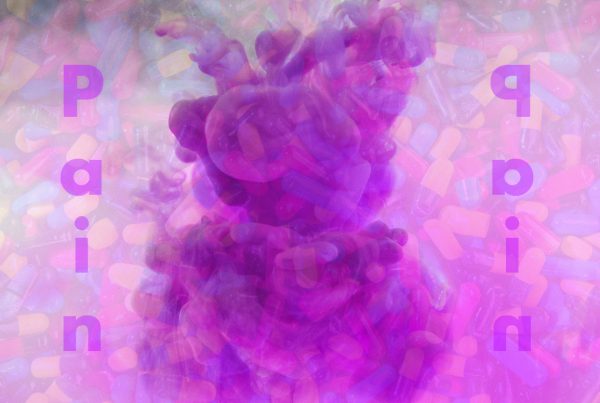Table of Contents
If you have been trying to find a solution for your vulvar pain with no luck then antidepressants might be an effective treatment for your pain.
Antidepressants are the main pain-blocking medications and often first-line agents prescribed by the medical community especially for generalized vulvodynia.
Additionally, recent reports have found that antidepressants can also be helpful in the treatment of vulvar vestibulitis (also called vestibulodynia).
#1: What Are Tricyclic Antidepressants?
Tricyclic Antidepressants (TCAs) are an older type of antidepressant created in the late 1950s. Their names derive from their chemical structure (which contains three rings of atoms).
#2: How Do TCAs Work?
TCAs are mainly used to treat depression, which from the chemical point of view is caused by an abnormal communication between the brain’s cells (known as neurons). This miscommunication is caused by an imbalance of chemicals called neurotransmitters (serotonin and norepinephrine).
TCAs alter the function of brain regions that are controlled by these neurotransmitters by increasing their levels. Thanks to this process, there are more neurotransmitters accessible in the body and brain, which elevates a person’s mood.
#3: TCAs for Vulvodynia
Please remember that although TCAs are mainly used in treating depression, this does not mean that your pain is in your head.
Serotonin and norepinephrine are neurotransmitters that are also responsible for modulating pain sensations.
Because of it, TCAs also have off-label use as a pain reliever to treat chronic pain. The medication modifies the way in which nerves send impulses to the spinal cord to produce the pain.
TCAs work best for burning, stabbing or shooting pain that originates from malfunction of the nerve due to, for example, injury, surgery or diseases, called neuropathic pain.
If you have any suspicion or got a diagnosis that your vulvodynia (especially generalized vulvodynia or vulvar vestibulitis) is linked to neuropathic pain, then your pain might be altered with TCAs.
#4: Types of TCAs for Vulvodynia Treatment
The most popular TCAs used in modulating vulvar pain are:
- Amitriptyline
- Imipramine
- Nortriptyline
- Doxepin
- Desipramine
#5: TCAs Dosage
Usually, TCAs for vulvodynia are administered in tablet form, however topical cream is also used.
Oral use
Oral doses of antidepressants like amitriptyline, start with a low dose (to avoid side effects) of as little as 10 mg/day. They are usually increased by 10mg-to-25mg each week or two till the pain subsides. The average dose of amitriptyline, for example, is 60mg per day (however, many need to increase the dose up to 100mg per day to see results). The maximum dose generally should not exceed 150 mg daily.
TCAs don’t work overnight. Response to treatment can take up to several weeks. Often it is necessary to continue with treatment for three to six months to see results.
However, usually, only moderate pain relief is experienced.
Oral Amitriptyline Study
According to studies a low dose of amitriptyline (10-20mg/day) and desipramine (150mg) were found ineffective for provoked vestibulodynia. However, studies with a higher dose of amitriptyline (40 to 60 mg/day) have shown improvement in pain score of 50% or more, for 47% to 59% of women who have localized provoked vestibulodynia and generalized unprovoked vulvodynia.
Resource: www.mdedge.com
Topical use
If you suffer from localized pain or vaginismus you might find a combination of topical amitriptyline 2% and baclofen 2% in a water washable base helpful. Doctors recommend applying 0.5ml of the compound to the affected area one to three times per day.
Some doctors also use topical doxepin 5% cream for vulvar pain. They recommend to apply it to affected skin daily, gradually increasing the number of daily applications to as many as four times.
Topical Amitriptyline Study
The effectiveness of topical amitriptyline 2% and baclofen 2% was shown in a retrospective review of 38 women who used it in Lipoderm cream for localized vestibular pain. 53% of participants experienced an improvement in symptoms of at least 60%.
Resource: www.mdedge.com
#6: Best Practices for TCAs Uses
#7: TCAs Side Effects
TCAs can cause a wide range of unpleasant side effects.
A topical version of the TCAs for vulvodynia might produce fewer side-effects because of its lower systematic absorption (which means that your body absorbs less of it than if you take it orally).
Side effects include:
- Tiredness
- Constipation
- Dry mouth
- Blurred vision
- Drowsiness
- Restless leg syndrome
- Metallic taste
- Lack of energy or an unusual energy level
- Abnormal sleeping patterns like difficulty falling or staying asleep or sleeping a lot
- Nausea and vomiting
- Lightheadedness while standing up due to a drop in blood pressure (orthostatic hypotension)
- Weight gain not caused by an increased appetite, that can be as much as one pound per month with about 25% of patients gaining 20 pounds or more
- Increased appetite
- Difficulty thinking clearly
- Urinary retention (difficulty urinating)
- Heart rhythm problems
- Rashes and hives
- Increased risk of seizures
- Narrow-angle glaucoma
- Sexual dysfunction
- Anxiety
- Dizziness
- Sweating
- Weakness
- Muscle twitches
- Confusion in elderly
- Jitteriness
- Irritation
- Seizures
- Stroke
#8: TCAs Interactions
IMPORTANT: Let your healthcare professional know if you are taking any other prescription and non-prescription medications, illegal, recreational, herbal, nutritional and dietary drugs.Some truly unpleasant side effects can be intensified.
TCAs interact with:
- Over-the-counter medications like Tagamet (cimetidine), which is used to reduce stomach acid:
- It may increase the concentration of the TCAs in the blood, further intensifying the drug’s side effects and toxicity
- Anticholinergic drugs, which are used to treat urinary incontinence and chronic obstructive pulmonary disease (COPD):
- They can cause intestinal paralysis if co-administered with TCAs
- Clonidine, which is used to treat hypertension:
- It can trigger a dangerous rise in blood pressure if used with TCAs
- Epinephrine, which is used to treat severe allergic reactions:
- It can trigger high blood pressure if taken with TCAs
- Monoamine oxidase inhibitors (MAO) like Marplan (isocarboxazid), Parnate (tranylcypromine) or Zyvox (linezolid), which can be also used as antibiotics and antidepressants:
- They can cause a fever, convulsion or even death if co-administered with TCAs
- OsmoPrep or Visicol, which are used for bowel preparation for colonoscopy
- Herbal remedies like St. John’s Wort
- Recreational drugs
- Alcohol
- It can block the action of TCAs and lessens the antidepressant action of these drugs. It also increases their sedating effects.
#9: TCAs Contraindication and Warnings
1. If you suffer from any of the conditions below, you should avoid taking TCAs:
- Angle-closure glaucoma
- Urinary retention
- Heart problems
- Thyroid problems
2. If you are pregnant (or planning to get pregnant):
TCAs should not be used if you are pregnant, breastfeeding or trying to conceive. Please talk to your doctor about possible risks to you and your baby, in order to weigh this against the benefits of using TCAs.
3. If you have diabetes:
TCAs may affect blood sugar levels. Monitor and check your blood sugar levels more frequently.
4. If you are over 65 years old:
TCAs should be prescribed with caution if you are 65 years and older because they increase the risk of falling.
#10: TCAs Discontinuation
Antidepressants, in general, can produce withdrawal symptoms, also known as discontinuation syndrome. You can minimize these symptoms by gradually reducing the dosage (from 10 to 25mg every few days if possible or slower) over a period of weeks to months.
Remember that you can also suffer from withdrawal symptoms if you miss a few doses!
Withdrawal symptoms might include:
- Anxiety
- Insomnia
- Headaches
- Nausea
- Malaise
- Motor disturbance
- Flu-like symptoms
- Restlessness
Conclusion
In this post, you can find overall information about TCAs (antidepressants) for vulvodynia:
- What TCAs are and how they work
- How and which TCAs can help with your vulvar pain
- Initial guidelines of how to take TCAs
- What types of side effects you might experience, including withdrawal symptoms and what you can do about them
- Possible interactions, contraindications, and warnings
Please don’t feel discouraged if you feel little to no relief while taking TCAs or if your pain will come back after the discontinuation of the medication.
Please keep in mind that TCAs like other types of traditional medications might not treat nor heal the underlying root cause of your vulvar pain. Rather than temporarily eliminating and curing evidence of the illness or masking the symptoms.TCAs also don’t heal your body.
Please remember that TCAs are definitely not the only solution available for vulvodynia. There are still other medical and natural remedies that you can explore.
Did you find this post helpful? If so what other types of information would you like me to share with you?
Have you ever taken TCAs? Did TCAs help your symptoms?
Share with me all of your thoughts, experiences, and questions in the comments below! You can also ask me anything directly on FB.
Disclaimer
My goal is to provide you with the most relevant and current information that is factually correct, comprehensive and up-to-date.
However, the drug information provided herein is subject to changes and is not intended to cover all possible:
- Uses
- Dosage indications and best practices for usage
- Side effects
- Drug interactions
- Contraindications and warnings
- Drug withdrawal symptoms
Additionally, each person is different and may respond differently to the drug.
Please also bear in mind, that this article should not be used as a substitute for the knowledge and expertise of a doctor or other licensed healthcare professionals. Please before taking any medication, consult it with your health provider, who knows your medical history.
Resources
- http://www.obgyn.net/pelvic-pain/clinical-management-vulvodynia
- http://www.obgyn.net/incontinence/vulvodynia-faqs
- https://www.mdedge.com/sites/default/files/Document/September-2017/2310OBG_LONKY.pdf
- https://www.nva.org/wp-content/uploads/2015/01/Haefner-Vulvodynia-Guideline-2005.pdf
- http://www.vulvalpainsociety.org/vps/index.php/treatments/antidepressants-a-anticonvulsants
- https://www.mayoclinic.org/pain-medications/art-20045647
- https://www.webmd.com/pain-management/chronic-pain-depression
- https://en.wikipedia.org/wiki/Tricyclic_antidepressant
- https://www.healthline.com/health/depression/tricyclic-antidepressants-tcas
- https://www.ncbi.nlm.nih.gov/pmc/articles/PMC5713449/
- https://www.rxlist.com/tricyclic_antidepressants_tcas/drugs-condition.htm
- https://www.everydayhealth.com/g00/tricyclic-antidepressants/guide/?i10c.encReferrer=&i10c.ua=1&i10c.dv=20
- https://www.verywellmind.com/tricyclic-antidepressants-379652
- https://en.wikipedia.org/wiki/Norepinephrine
- https://en.wikipedia.org/wiki/Serotonin
START YOUR JOURNEY TOWARDS HEALING
Because life’s too short. And you deserve to be healthy + happy.






